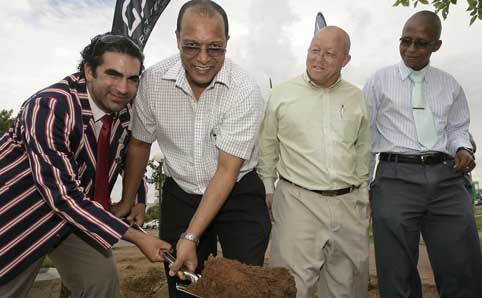Latest News Archive
Please select Category, Year, and then Month to display items
12 October 2020
|
Story Arina Engelbrecht
|
Photo Supplied
 Arina Engelbrecht from Organisational Development and Employee Well-being believes physical activity has a number of benefits for one’s health, including stress relief.
Arina Engelbrecht from Organisational Development and Employee Well-being believes physical activity has a number of benefits for one’s health, including stress relief.
Being physically active plays a big role in preventing the development of mental-health problems and in improving the quality of life of people experiencing mental-health problems.
Treatment for depression
Physical activity can be an alternative treatment for depression. It can be used as a stand-alone treatment or in combination with medication and/or psychological therapy. It promotes all kinds of changes in the brain, including neural growth, reduced inflammation, and new activity patterns are formed that promote feelings of calm and well-being. It releases endorphins – powerful chemicals in the brain that energise your spirit and make you feel good.
Physical activity can be very effective in relieving stress. Research in adults has found that physically active individuals tend to have lower stress levels compared to individuals who are less active. It also leads to improved sleep. When a person sleeps better and feels more rested, overall quality of life improves. They cope better with daily life stressors.
Reduce Alzheimer's risk
Regular physical activity can reduce your risk of developing Alzheimer's disease by up to 50%. It can also slow down further deterioration in those who have already started to develop cognitive problems. It stimulates the brain’s ability to maintain old connections as well as to make new ones.
A study asked people to rate their mood immediately after periods of physical activity (e.g. going for a walk/run, cycling, doing housework) and periods of inactivity (e.g. reading a book or watching television). Researchers found that participants felt more content, more awake, and calmer after being physically active compared to after periods of inactivity.
In conclusion, people who are physically active feel a sense of well-being, feel more energetic throughout the day, sleep better at night, have sharper memories, and feel more relaxed and positive about themselves and their lives.
“Being physically active not only changes your body, it changes your mind,
attitude, and your mood.” – Arina Engelbrecht
Construction work on new residences begins
2012-02-24
 |
|
From left are: Richard Chemaly, SRC President; Mr Quintin Koetaan; Prof. Nicky Morgan, Vice-Rector: Operations and Mr Pura Mgolombane, Assistant Dean: Student Affairs, at the sod turning ceremony.
Photo: Johan Roux
24 February 2012
|
Construction of two new residences on our Bloemfontein Campus will begin soon. Some 500 students will be accommodated in the residences, with the first students able to move in from January 2013.
The premises where the residences will be built were recently handed over to the contractors.
Mr Rudi Buys, Dean of Student Affairs, says that the design of the residences follow global trends in student accommodation, but are adapted to local needs and student communities. The new residences will provide more study and tutoring spaces, also with more open space for diverse students to socialise. The residences will function together as a Student Life College.
Mr Quintin Koetaan, Director: Housing and Residence Affairs, says the new residences will house both junior and senior students. Residences will co-ed, with men and women housed in separate and secure passages.
The planned construction of student accommodation includes five new residences – four on the Bloemfontein Campus that will provide 1000 beds and one on the Qwaqwa Campus with 250 beds. This will provide for the increasing need for student accommodation. The project will be completed in two phases. Phase one commenced in Bloemfontein on 21 February 2012.